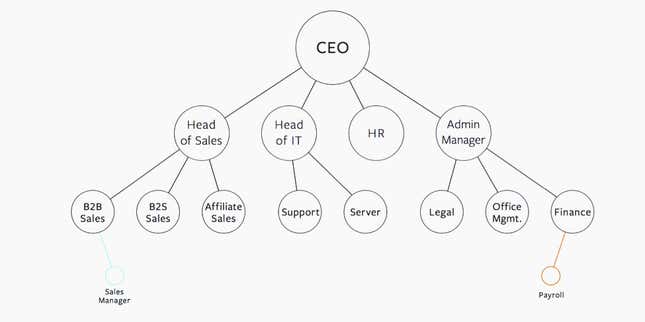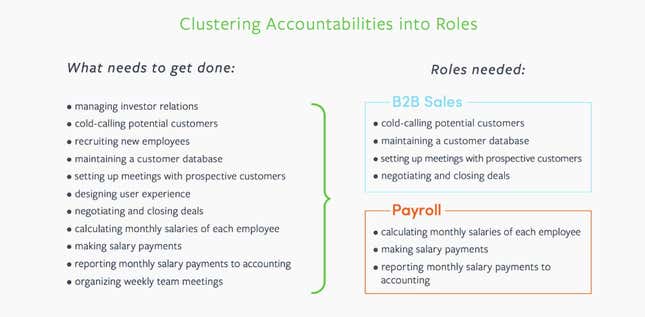This is the story of a drastic change that resulted in an astonishingly productive seven weeks.
More specifically: this is the story of how a little startup in Berlin fired the word “manager,” scrapped all the other job titles, too, and tripled its monthly revenue.
The background
Our startup Blinkist, now over 20 strong, focuses on creating summaries of nonfiction books that you can read in an app. We built Blinkist for busy people who want to read every day, but might only have 15 minutes on their commute or lunch break to do it. Unsurprisingly, these busy people have been asking for audio versions of our content since we launched Blinkist in early 2013.
And we kept balking.
The thing was, the barrier to offering audio felt high. Between hiring narrators, buying equipment, and producing, we knew audio would be an expensive undertaking. Perhaps even more important, getting the project running would require a staff we simply didn’t have. Audio was out of the question—at least for the next 6-8 months. Our departmental structure just wasn’t flexible enough to undertake such a multi-disciplinary project, as everyone was focused on their existing work.
Then, in the last quarter of 2014, two unrelated but critical things happened:
First, we mapped out the “nice-to-have” features that in a perfect world, we’d build in 2015. This included audio.
Then, realizing we needed to become a nimbler, more flexible company in order to create those features, we transformed our management system from the industry-standard “command and control” to a light version of a hierarchy-free governance system called Holacracy.
What did this shift mean in practice?
Based on rigid, boring hierarchies, command and control management has been around since the Industrial Revolution. Under this system, employees operate strictly within the realm of their own department and job title, completing tasks as assigned by those above them in the hierarchy. There’s little room for innovation or independent thought.
At Blinkist, we got rid of all of this. Instead of job titles and departments, people take on flexible, ever-changing roles according to their skillset and the current demands of the company.
Managers in the traditional sense are a thing of the past too. With Holacracy, people are given the independence to pursue their roles in the best way they see fit. After all, who better to decide how to do a job than the person most familiar with it?
What happened next?
If you guessed “chaos” you’d be a little right—but mostly dead wrong.
Sure, initially, there was a bit of confusion and discomfort. People had to get used to being manager-free, and former “managers” had to get used to taking their hands off of the steering wheel. Before long, almost without us realizing it was happening, audio was under way. What none of us expected was that in less than two months we’d have thousands of delighted audio-nerds listening to our content.
Getting this dream project started is something we credit largely to squashing our hierarchies dead flat and stripping everyone of their job titles.
Death to the job title, long live roles!

In an old-school hierarchical organization, a higher-up chooses a title—say, Sales Manager—for an individual. Based on that title, they attempt to outline the tasks that person might complete.
One of the problems here is that the work for which that title is responsible becomes disconnected from the greater vision of the company. If all a manager does is assemble a haphazard set of responsibilities that sound like what a Sales Manager “should” be doing, important work is likely to slip through the cracks.
Roles, however, are designed to make certain that the opposite is true.
The very first step in developing a role is to lay out all the actions that need to be taken for the company to succeed. These are called “accountabilities.” Roles are then built by creating clusters of these accountabilities. A role like B2B Sales, for example, might have accountabilities like contacting key customers and compiling sales reports. Once all of the roles have been developed, none of the mission-critical accountabilities you outlined are left without an owner.

Here’s what makes this both effective and fun: one person might well take on the seemingly distant roles of “B2B sales” and that of “Payroll,” as long as that person has the skills and resources to do so. This comes with two main benefits for a team and a company:
- Unlike titles, roles let polymaths use all of their skills—even the ones seemingly unrelated to what they were hired for. Instead of bright, multi-talented employees languishing in an air-tight title, they get to apply their skills and make real impact wherever they’re able.
- That one employee is now free to use his or her skills for a number of roles may mean that the business itself has less need to recruit, hire, and train new staff. That translates to time and money saved, and also leaves critical aspects of a business in the hands of people who already love and understand it: the core team of amazing people who are already there.
At Blinkist, that second benefit was key to launching audio.
Outlining accountabilities in our team gave people a crystal-clear idea of what their roles and attendant responsibilities were. Even more significant, because they no longer felt restricted to a single function within the organization, our employees were able to see how they as people with abilities—not just titles—could fill the roles that would make our nice-to-have audio dream into a next-on-the-list feature.
And they’re off!
So what happened once our team was freed from narrow titles? Our copywriter stepped into the audio recruiting role. An editor started coordinating the four narrators we found. One of our freelance writers happened to be a sound technician, and he took on the role of producer, developing the audio versions of our content in his at-home studio right away. Blinkist’s tech lead adopted the role of audio experience designer, researching different options for integrating audio in the app and how to get it done.

Within two months, the Blinkist audio project went from being a pipe dream to a concrete feature that we were able to offer with our December launch. And now, going on three months into 2015, what feature do people most often write us to enthuse over? You guessed it: audio! Add to this the fact that audio has been the primary driver for our threefold increase in monthly revenue, and we feel pretty good about saying that it’s been a success.
Some final thoughts
For us, switching from titles to roles showed us that we didn’t need a separate staff to bring Blinkist audio to the world. Nixing titles in favor of roles freed creativity and drive, and also ratcheted up our productivity. Once we switched to roles, everyone felt more certain about what they needed to do next to push the project forward.
It would be omitting an important part of the experience if we didn’t report that there have been social benefits, too. The combination of using their secret talents and having complete clarity on responsibilities has made our team happier, more enthusiastic, and allowed us to learn new skills that might never have emerged had we been jammed into the narrow confines of a job title. And what do you think happens when happy employees tackle roles that perfectly fit their interests and skillsets? Stuff gets done very effectively, that’s what.
Another benefit of switching to roles is that it’s helped us get better at talking to each other. Roles let us discuss issues dispassionately by creating distance between the individual and their work. When the ego with which a job title is naturally freighted melts away, what replaces it is common sense and, usually, greater freedom to solve problems rather than protect hurt feelings. Someone saying “The B2B role is not being fulfilled” sounds much less personal and abrasive than “The Sales Manager is not doing her job.” The semantic distance helps people be constructive and not take criticism personally.
Finally, one last benefit is a much stronger sense of unity in the company. Without departmental silos, everyone feels like they’re part of the same team, pulling in the same direction for one greater goal. This in turn translates into a much more supportive work environment, stripped of traditional office politics and conflicts.
A little note: Switching from titles to roles and abolishing “management” wasn’t the only thing that helped Blinkist soar.
Because our team is small and we didn’t suffer under the weight of years’-worth of bad habits and disappointed expectations, we didn’t need to overhaul our entire organization. Instead, we adapted our own, lighter version of the Holacracy One’s (frankly, pretty great) system, called Blinkracy. We even wrote an ebook on it, and we’re still testing elements of it. All in all, getting rid of roles was the first step toward a system that’s encouraged huge improvements in our team and our productivity. We can’t say it’ll work for everyone, but what have you got to lose? Probably only a bunch of misconceptions about what is—and isn’t—possible.
